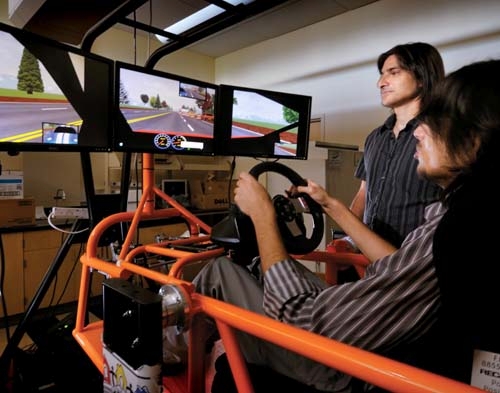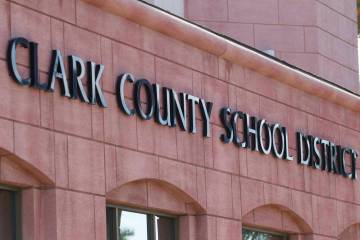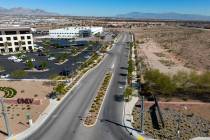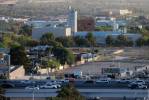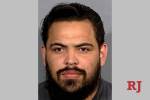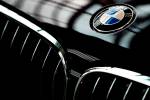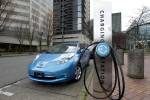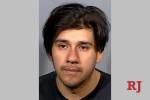UNLV researcher wants to drive you to distraction
The skinny guy with the long hair, the earring, the jeans and the boots is more than he seems.
Pushkin Kachroo is an author, a researcher and a professor at UNLV, and he's going to change the way you think about driving your car.
"We kill 35,000 to 40,000 people a year," he says. "We kill them. It's like a war going on."
Kachroo directs the university's Transportation Research Center, which, if battling traffic fatalities really were a war, would be the intelligence service. Its researchers gather data, analyze it, and try to figure out how to apply the lessons to the real world.
Kachroo, with doctorate degrees in engineering and math, always has a handful of research projects going on simultaneously. Right now, the one that's grabbing his attention focuses on distracted driving.
That's timely, given that Nevada's new law forbidding the use of hand-held cellphones while driving went into effect Saturday.
"Distraction makes you drive erratically," Kachroo says.
While there isn't a lot of solid data on distracted driving -- something Kachroo intends to fix -- he says the data that is available is clear.
"Distraction makes your driving worse," he says. "It's so obvious, there's no debate about it."
He can prove it with his simulator, which he has taken on the road -- to a bar, a casino -- and allowed people to test it in the real world.
More of that is coming. The center's community outreach arm will take the simulator to schools and other community gathering spots in the coming weeks. In partnership with Cricket Communications, the simulator will stop by schools during teen driver safety week, Oct. 17-21.
People will be able to try it while purposely distracted.
But the simulator is far from perfect. It's not a top-of-the-line piece of hardware, having been purchased for about the price of a new car, entirely with grant money, rather than the $1 million or so a top simulator can go for.
But that's not a big deal, Kachroo says. It's the software that matters.
What's programmed in the simulator now is all prepackaged stuff, like an old-school video game.
"This wasn't designed for the work we're doing here," Kachroo says.
The ambition is to create a new reality within the simulator using real-world data, and then measure the bodily responses of people who are driving in it as various distractions come their way.
A ringing cellphone. Does your heartbeat increase?
Finding a great song on the radio. Does your EKG show signs of change?
And what are the effects on your driving? Is there a pattern? If your heart rate changes when you are distracted, does your driving change every time, too?
If there's a pattern, researchers might be able to predict real-world consequences on a large scale.
This sort of thing has never been done before.
"This is a tool we're building that does not exist anywhere in the world," Kachroo says. "It's an opportunity to create something that takes the field forward."
The plan is to use real road conditions, such as those on Interstate 15, and to design pedestrian and bicyclist simulations using actual pedestrians and bicyclists by hooking people up to an Xbox Kinect, the video game console that transforms a person's body into a video game controller.
All that will be put into simulator software, and then the "driver" will be hooked up.
"The idea is that when you're driving, we see not only your physical performance, but your physiological data as well," Kachroo says.
Graduate students are key to a project such as this, he says.
One of those students is Romesh Khaddar, who, like Kachroo, is originally from India. Khaddar says he chose to study for his master's degree in electrical engineering at the University of Nevada, Las Vegas specifically so that he could study under Kachroo.
He says the goal is to license the software, then sell it -- to research centers, universities, state transportation departments, even to transportation agencies around the world.
Because software such as this does not yet exist, UNLV would have a monopoly.
"It's going to be a very comprehensive package," Khaddar says.
The data collected, Khaddar and Kachroo say, will ultimately save lives.
Do bans on cellphones work? They'll find out one day.
"I expect huge things from this," Kachroo says.
Contact reporter Richard Lake at
rlake@reviewjournal.com or 702-383-0307.



